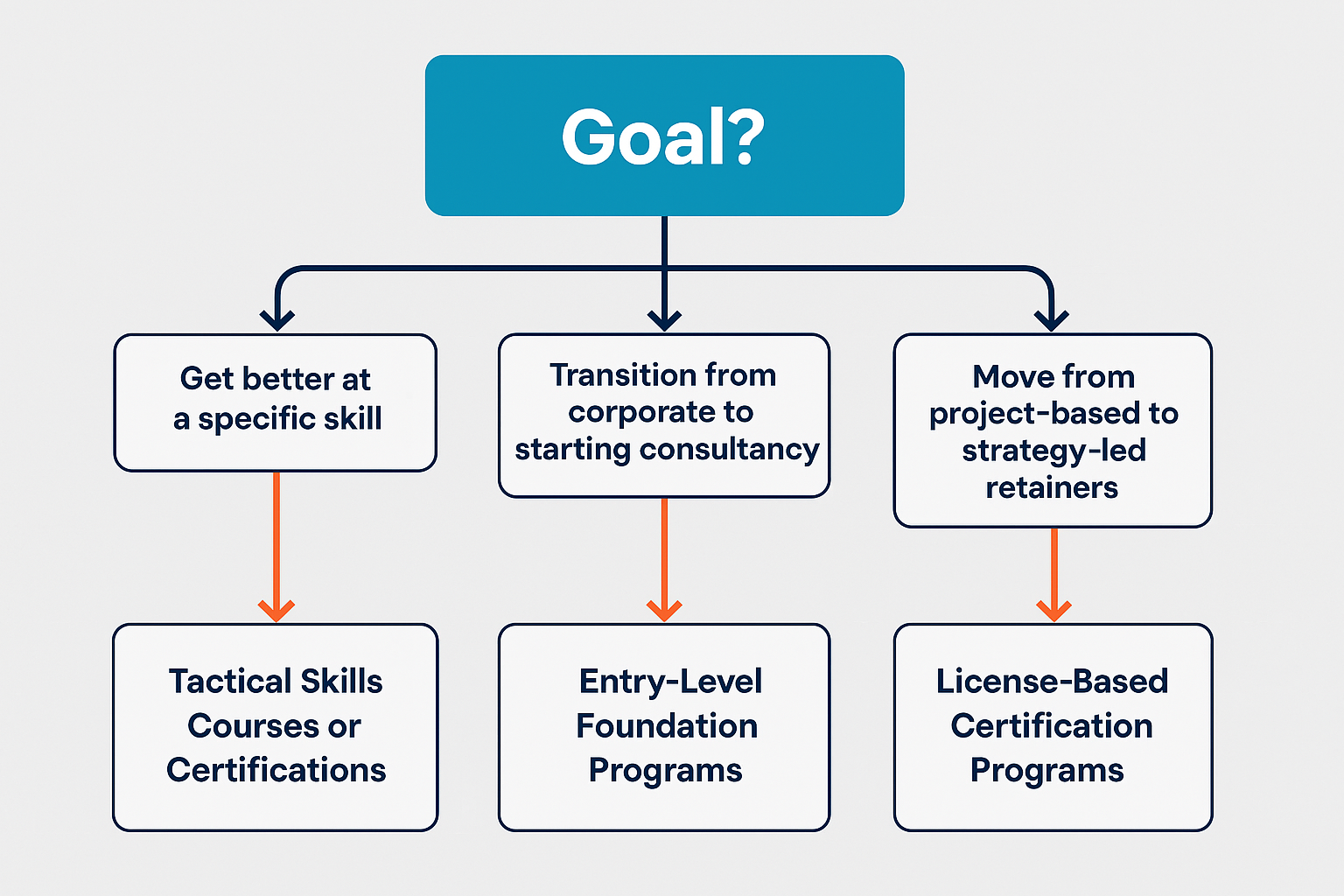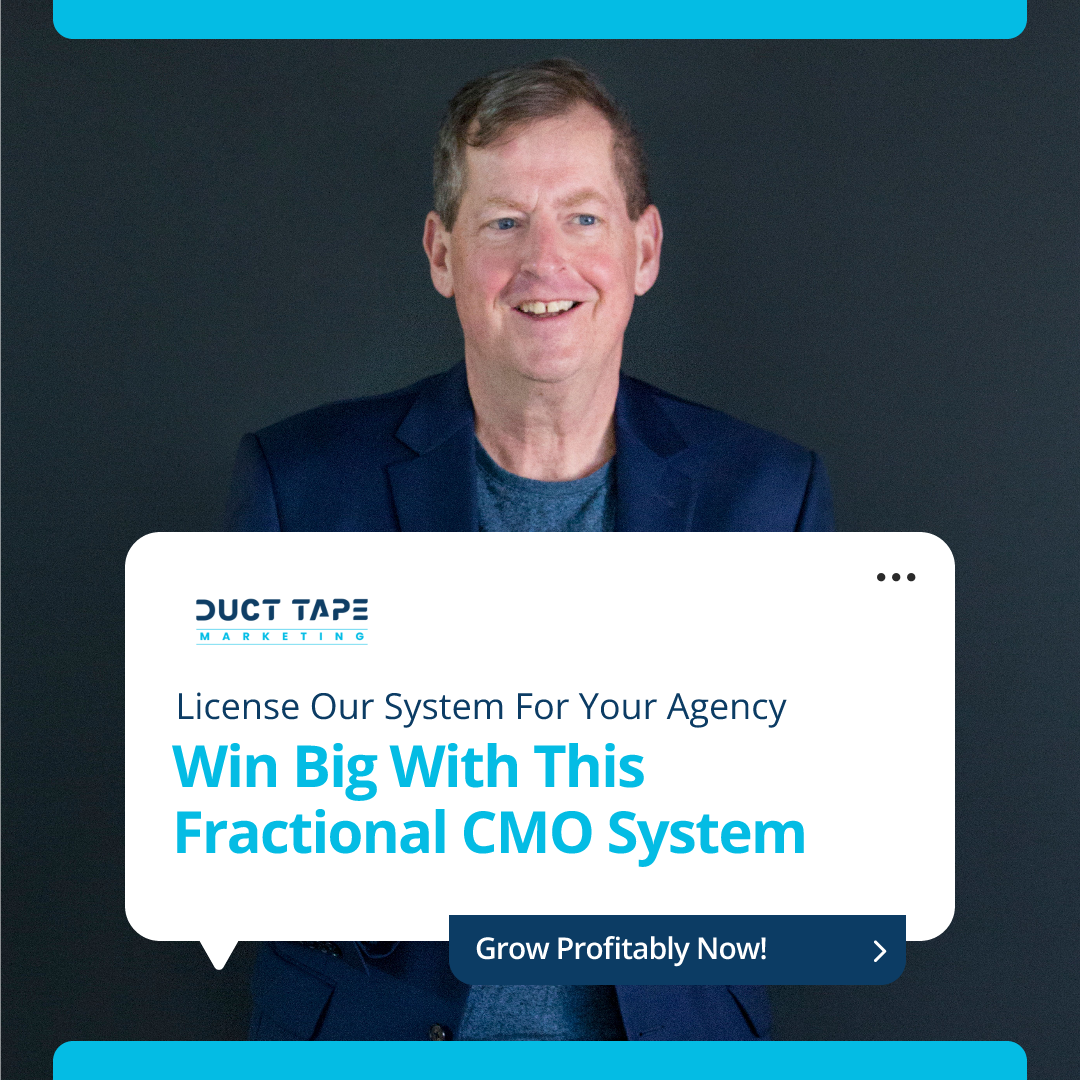Choosing the Right Marketing Practice Growth Program: A Clear Guide to Types, Fit, and Costs written by John Jantsch read more at Duct Tape Marketing
As a marketing agency owner or fractional CMO, you know the importance of staying ahead – not just in tactics, but in how you run and grow your marketing business.
You might be considering a marketing certification for consultants or a fractional CMO training program to sharpen your skills, differentiate your services, and build recurring revenue
But with so many “courses,” “certifications,” and “accelerators” out there, it’s easy to feel overwhelmed. How do you know which program is right for your goals, and what kind of investment makes sense? In this article, we’ll answer those questions with the transparency you deserve.
The key is finding a marketing agency training program that aligns with your business goals. Whether you’re looking for a quick credential or a comprehensive system to transform your agency, this guide will break down your options in a clear, skimmable way.
We’ll break down the types of programs available, who they’re best for, and typical cost ranges so you can make an informed choice. Consider this a no-nonsense guide to help you find the best fit for your needs.
In a rush? Below you’ll find a handy comparison of marketing leadership certification types, by format, support, and price.
TL;DR: What’s the Best Marketing Program for You?
To make it easier to scan, here’s a comparison table summarizing these program types, their formats, support levels, and typical price ranges:
|
Program Type |
Format and Content |
Support Level |
Typical Pricing |
|---|---|---|---|
|
Tactical Skills Courses |
Self-paced online videos or short workshops focusing on one skill (SEO, ads, etc.) |
Low – mostly DIY learning (maybe forums or basic Q&A) |
Free – $500 (many free tool certifications; paid courses usually under a few hundred) |
|
Entry-Level Foundation Programs |
Multi-week online course or group coaching for new freelancers/consultants (covers business setup, pricing, basic marketing) |
Moderate – group calls, community of peers, templates for basics |
~$500 – $3,000 (depending on program length and mentorship provided) |
|
2–5 day intensive (virtual or in-person) on strategy or specific advanced topic; often interactive |
High during event – live coaching, interactive exercises; some offer post-workshop community |
~$5,000 – $10,000 (short local classes on low end; premium multi-day bootcamps on high end) |
|
|
License/Certification Programs |
Comprehensive training (often weeks or an intensive kickoff) in a proprietary system; includes frameworks, tools/templates, and ongoing training |
High – initial deep-dive training + ongoing support (coaching calls, updates) and private network of fellow licensees |
~$5,000 – $15,000 (one-time or annual) for full system and certification (significant, but comes with a ready-made methodology and assets) |
|
Partner/Reseller Programs |
Training focused on a specific software/platform; you become a certified partner/reseller of that product |
Moderate – support from vendor (sales materials, tech support); peer partner forums |
Free or low cost to join, but requires investment in the platform (e.g. buying software licenses, which might be $300+/mo or meeting sales quotas to remain active) |
|
Masterminds Accelerator Done For You |
Ongoing program (6–12+ months, often renewable yearly) with group coaching, mastermind meetings, and sometimes live retreats |
Very High – frequent coaching, peer accountability, sometimes 1:1 mentorship; access to an exclusive network of successful peers |
$10,000 – $50,000+ per year (significant investment for mature businesses ready to scale) |
(Note: These price ranges are broad averages. A “course” could be a $20 Udemy special or a $1,000 professional course; a big-name mastermind might run even above the ranges shown. Always check what’s included and the duration when comparing costs.)
As you can see, each type of program serves a different purpose. The best choice depends on the problem you’re trying to solve or the goal you’re aiming for. In the next section, we’ll map common goals to the program type that usually fits best. Find the scenario that sounds like you, and see which option might be your perfect match.
Why Consider a Marketing Leadership Program? (And Do You Really Need One?)
Running a marketing agency or consultancy is hard. You’re juggling client deliverables, trying to stand out from competitors, and aiming to create steady, predictable income. It’s no wonder many agency owners seek out marketing business training or certifications to gain an edge. Here are a few common reasons you might be exploring these programs:
-
You want a proven system – Maybe you feel your agency’s processes are all over the place. A good training program—especially one rooted in a strategy-first can streamline your agency’s operations. These marketing training programs for agencies often include templates, tools, and systems you can use immediately.
-
You want to scale and build recurring revenue – Project work and one-off engagements make it tough to forecast income. The right program can show you how to package retainer offers or ongoing strategy services, creating stable monthly revenue.
-
You need to differentiate your agency – In a crowded market, having a certification or unique methodology can set you apart. It signals to clients that you follow a reputable, established approach (not just winging it).
-
You’re looking for credibility and confidence – Perhaps you’ve primarily executed marketing campaigns and now you’re moving into a leadership role (as an agency CEO or fractional CMO). A marketing leadership certification can boost your confidence and authority to engage higher-value clients as a true strategic advisor.
-
You don’t want to “go it alone” – Being a solo consultant or small agency owner can be isolating. Many programs offer community, coaching, or mentorship, so you can learn from peers and experts instead of figuring everything out by yourself.
Honest insight: You can succeed without any formal certification – plenty of agencies grow through trial and error. But a structured marketing consultant training program can dramatically shortcut your learning curve. Rather than spending years cobbling together processes, you could adopt a ready-made system in a matter of weeks. The result? Saved time, fewer mistakes, and potentially faster growth and ROI.
If any of those reasons resonate with you, it’s worth examining the different marketing agency certification and training options available. Not all programs are created equal – and the most expensive or prestigious option isn’t necessarily the best for your business. In the next sections, we’ll break down the main types of programs and what to expect from each.
Types of Marketing Programs for Consultants & Agencies
Not all marketing training or growth programs are created equal. Some are as simple as a self-paced online course you can knock out in a weekend; others are high-ticket masterminds that require serious commitment (and cash). Here are some common program types you’ll come across, along with what they generally involve:
Tactical Skills Courses for Marketing Consultants:
Focused courses on specific marketing skills (SEO, Google Ads, email marketing, etc.). Usually, on-demand video lessons or workshops teaching you how to do a particular thing. Little to no personalized support beyond maybe a forum or basic Q&A. Great for picking up a new skill or certification quickly.
Cost: often low (many are free or under a few hundred dollars). Check out Google’s Marketing Trainings or LinkedIn Learning.
Entry-Level “Business Foundations” Programs:
Introductory programs for freelancers or new solo-agency owners covering business basics. They might teach you how to package your services, set your pricing, find your first clients, and avoid common newbie mistakes. Format can be a short cohort-based course or coaching group. Support is moderate (group calls or an online community).
Cost: ranges widely from a few hundred to a few thousand dollars depending on depth (some may start around $500 and go up to a few thousand dollars for multi-week coaching).
Multi-Day Intensive Workshops:
Short-term, immersive trainings (often 2–5 days) that dive into strategy and best practices, usually with a live or in-person component. These often include interactive sessions and networking with peers. Support is high during the event (hands-on guidance, hot seats, etc.), and sometimes you get access to a community or follow-up resources for accountability.
Cost: typically mid-range; many intensives run $5,000–$10,000 depending on the length and prestige of the facilitator (some local workshops might be on the lower end, while well-known strategy bootcamps can be several thousands).
License-Based Certification Programs:
Comprehensive programs that teach you a proven system or methodology for marketing (often a strategy-first approach) and license you to use it with your clients. These usually include extensive training (sometimes an initial intensive or cohort), libraries of tools and templates, and ongoing support like coaching calls or a private network of fellow certified professionals. It’s like getting a business-in-a-box for your consultancy: you learn the framework, get materials to implement it, and often earn an official certification.
Cost: higher investment, reflecting the depth – commonly $5,000 to $15,000 for the program business.com (some are one-time fees, others have annual licensing fees or revenue share models). In return, you gain a repeatable framework to deliver services, plus continued resources and community.
Partner/Reseller Programs (Software Ecosystems):
These programs affiliate you with a software or platform (for example, a CRM, marketing automation tool, or analytics software). They typically involve training on the platform and how to sell or service it, and you might get a “partner” or reseller status. The format often includes online training modules and a partner community; support comes from the vendor (account managers, sales resources, etc.).
Cost: usually low or no direct fee to join – the trade-off is you’re expected to promote that company’s software. Often your cost is the purchase of the software itself (which you might resell to clients) or meeting a sales quota. In other words, the platform training might be free, but you’ll incur expenses in subscription fees or the time/effort to sell it. This path can create a nice recurring revenue stream (commissions or margin on software subscriptions) if you plan to build your services tightly around a particular tool.
Masterminds & Agency Accelerators:
High-touch growth programs for established agencies or consultants. These are typically group coaching programs or mastermind groups aimed at scaling up your business (common goals: hitting $1M+ revenue, building your team, improving profitability, etc.). Format often includes regular coaching calls (with a mentor who’s been there, done that), peer mastermind sessions, and sometimes in-person retreats or events. Support level is very high – you get mentorship, accountability, and a network of other high-performing peers.
Cost: significant – often five-figure annual investments. Many quality agency mastermind programs charge on the order of $10,000 to $50,000 per year (or more for top-tier circles). These are not for beginners; they’re for when you’re ready to pour fuel on the fire and can justify a sizable investment in exchange for potentially big leaps in growth.
Choose the Right Marketing Program Based on Your Business Goals

It’s time to get personal. Think about what you really want to achieve at this stage in your business or career. Are you looking to sharpen a specific skill set? Launch your own consultancy? Completely overhaul your agency’s business model? Different goals call for different solutions. Let’s explore a few typical scenarios and recommend the program type that tends to be the best fit for each, along with what to expect and key pros and cons.
Goal: “I want to get better at a specific skill.”
Scenario: You’re doing consulting or running an agency and want to sharpen one skill – like SEO, Google Ads, or copywriting – without overhauling your business.
Program: Tactical Skills Courses or Certifications
What to Expect: On-demand video lessons or short workshops that teach one topic step by step. Limited support – maybe forums or weekly Q&A.
Investment: Usually free to a few hundred dollars. Time commitment is light (a few hours to a few weeks).
Pros: Affordable, focused, and flexible. Great for filling knowledge gaps fast.
Cons: Narrow scope. Little business guidance or long-term support.
Takeaway: For a single skills upgrade, skip the big programs. A targeted course or certification gets the job done quickly and cheaply.
Goal: “I want to transition from corporate to starting my own consultancy.”
Scenario: You’re leaving a corporate marketing role and want to start your own consultancy or solo agency. You have the marketing skills, but not the business-building know-how.
Program: Entry-Level Foundation Programs
What to Expect: These 4–12 week programs teach basics like packaging services, setting pricing, and finding clients. Includes video lessons, group coaching, templates, and community support.
Investment: ~$500–$3,000 depending on format and coaching.
Pros: Saves time and helps avoid early mistakes. Built-in support and templates fast-track setup.
Cons: Covers broad basics, not deep dives. Quality varies.
Takeaway: If you’re going out on your own, start with a program that teaches business fundamentals – not just marketing.
Goal: “I want to move from project-based work to strategy-led retainers.”
Scenario: You’re doing one-off projects and want to offer long-term strategic services instead.
Program: License-Based Certification Programs
What to Expect: Intensive training in a strategy framework, plus tools and templates for client delivery. Ongoing support through coaching calls and a private network.
Investment: ~$5,000–$15,000, plus possible licensing or renewal fees.
Pros: Provides a proven system and confidence to sell strategy retainers. Includes ongoing support and tools.
Cons: High upfront cost. Requires full commitment to the framework.
Takeaway: To move into strategy-first retainers, invest in a framework that gives you structure, tools, and support to reposition your services.
Related Articles:
Goal: “I want to scale my agency past $1M in revenue.”
Scenario: You’ve built a stable agency and want help breaking through growth ceilings like hiring, positioning, or systems.
Program: Agency Masterminds or Accelerators
What to Expect: Includes coaching, mastermind calls, strategic playbooks, and live events. Emphasis is on scaling operations, team, and leadership – not tactics.
Investment: ~$10,000–$50,000/year. May require travel and 12-month commitment.
Pros: Offers mentorship and peer accountability. Helps fast-track decisions and avoid trial-and-error.
Cons: Requires time, money, and focus to implement. Fit depends on group quality and stage alignment.
Takeaway: For established agencies ready to scale, a mastermind or accelerator provides the strategic support and peer insight needed to grow faster and smarter.
Related Articles:
-
Marketing Leadership as a Service (MLaaS)
Goal: “I want to become a fractional CMO with a few high-ticket clients.”
Scenario: You want to serve a small number of clients in a part-time, high-level strategic role – without managing a big team.
Program: Fractional CMO Coaching or Strategy Certification
What to Expect: Focus on packaging your offer, pricing retainer engagements, and leading strategy. Delivered via coaching, peer groups, or system-based certifications.
Investment: ~$5,000–$15,000 for certifications; ~$800–$1,000/month for coaching programs.
Pros: Helps position and sell premium strategic services. Often includes support, templates, and community.
Cons: Not easily scalable beyond your time. May require personal brand building and network leverage.
Takeaway: If your goal is fewer, higher-paying clients and deep strategic work, a focused program will help you build and sell a compelling fractional CMO offer.
Related Articles:
Making Your Decision: Which Marketing Training Program is right for you?
Choosing the right program comes down to matching your goal and stage with the program’s purpose:
- If you have a single skills gap, take a course or get a specific certification (no need to over-invest).
- If you’re just starting out on your own, build your business fundamentals with an entry-level program or community – getting those basics right will pay off for years.
- If you need to level up your service offering, especially to incorporate strategy and get recurring revenue, a certification or licensing program that provides a proven system can be a game-changer.
- If you’re already established and aiming higher, a mastermind/accelerator can provide the mentorship and peer group to break through growth plateaus.
- And for those pursuing a fractional CMO model, ensure you have a strategic framework and support system in place – whether through a certification or a peer coaching group – to help you successfully navigate that niche.
Finally, remember that no program is a magic bullet. Your results will depend on your effort. The best program in the world won’t help if you don’t do the work, and even a mediocre program can yield value if you actively apply yourself and extract insights. Before plunking down money, get clear on what exactly you want to get out of it, and how you’ll hold yourself accountable to use what you learn.
Choose the Right Marketing Certification for Long-Term Growth
The landscape of marketing certifications and training programs for consultants, agency owners, and fractional CMOs is more diverse and more valuable than ever. Whether you’re looking to master a tactical skill, adopt a proven client delivery system, or join a high-level agency mastermind, there’s a training option designed to meet your goals.
As you evaluate your next step, start with clarity: What problem are you trying to solve? The best ROI doesn’t come from the most expensive program, it comes from choosing the right one based on your business stage, growth targets, and service model. From lightweight online marketing courses to full-scale strategy certifications, every program type serves a purpose
Lastly, be strategic with your education investments, just as you are with your business. When in doubt, lean towards programs that emphasize strategy, systems, and support/network – those elements tend to deliver enduring value. (That might be a tiny hint from our perspective, as we strongly believe in strategy-first growth and comprehensive support, given our own experience in this space.)
We hope this breakdown has helped clarify the options and trade-offs. By understanding what’s out there and assessing where you want to go, you’re well on your way to making a smart decision. Here’s to your growth – whether that means mastering a new skill, signing better clients, or hitting that next revenue milestone, the right program is out there waiting to help you make it happen. Good luck, and happy learning!




